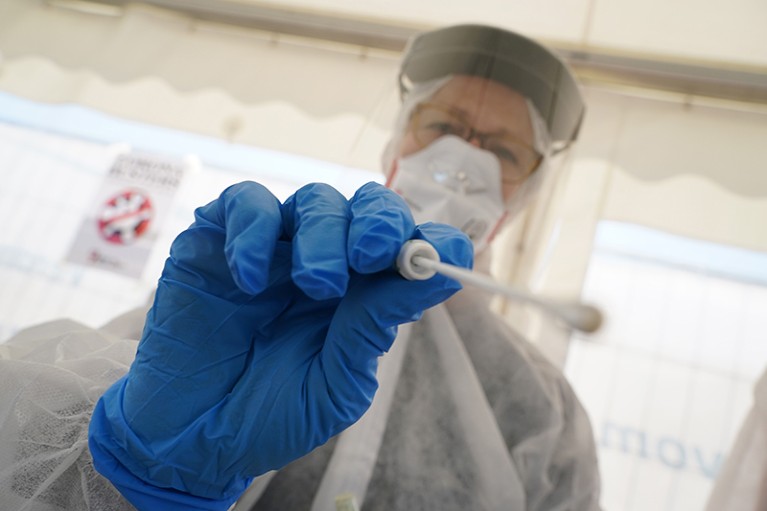Infection
Had COVID but no symptoms? You might have this genetic mutation
Asymptomatic infections with SARS-CoV-2 are common, thanks in part, perhaps, to a newly identified genetic mutation.Credit: Sean Gallup/Getty
At least 20% of people who become infected with the SARS-CoV-2 coronavirus never feel sick. Now scientists have identified a genetic mutation that is linked to a higher likelihood of avoiding symptoms during infection1.
This mutation might give an advantage to the immune cells of people who have previously been exposed to ‘seasonal’ coronaviruses, which cause the common cold. That extra boost means the immune system can quickly track down and destroy SARS-CoV-2 before it goes haywire trying to defend against the pathogen, says Jill Hollenbach, an immunogeneticist at the University of California, San Francisco, who co-authored the report. It was published on 19 July in Nature.
The study “deserves a round of applause”, says Jean-Laurent Casanova, a paediatric immunologist at the Rockefeller University in New York City. The researchers show a “modest” link, but it’s “stronger than any other association for a common gene published” on COVID-19, he says.
The lucky ones
Many studies exploring the link between genetics and COVID-19 risk have focused on how it causes severe disease or death. These are important studies, Hollenbach says, but most people infected with SARS-CoV-2 have a mild bout of the illness.
To detect people with asymptomatic infections, the authors tapped into a database of bone-marrow donors and enrolled nearly 30,000 people. Participants reported any positive tests for SARS-CoV-2 and any symptoms. Of more than 1,400 participants who tested positive during the 15-month study, which was conducted before vaccines were widely available, 136 remained asymptomatic.

Delta’s rise is fuelled by rampant spread from people who feel fine
The researchers then looked for any link between people who had asymptomatic infections and variations in HLA genes, which encode proteins found on the surfaces of nearly all cells of the body. The proteins display fragments of potential invaders to the immune system, prompting immune defenders called T cells to spring into action against the invaders.
The authors found a link between asymptomatic infection and an HLA mutation carried by about 10% of the study’s population. People with the mutated gene were twice as likely to remain asymptomatic as were people without it; people with two copies of the gene were eight times as likely. “We were pretty stunned by the magnitude of the effect,” Hollenbach says.
Researchers conducted the main analyses on participants who self-identified as white, because they did not have enough people from other ethnic and racial groups to analyse, they write. The authors also found evidence for the link in Black individuals, but the result is less clear in Asian and Hispanic people, they say.
Immune cells remember
To understand how the variant helps to prevent symptoms, the authors homed in on its interaction with T cells. The team obtained T cells that had been collected before the pandemic from people who had the protective variant. Because the cells had never been exposed to SARS-CoV-2, they had no ‘memory’ of the virus. Even so, the T cells went on the attack when the HLA protein presented them with a fragment of SARS-CoV-2’s ‘spike’ protein.
This fragment is structurally similar to fragments of the spike proteins wielded by seasonal coronaviruses, the authors find. That similarity might enable T cells previously exposed to common-cold coronaviruses to recognize and mount an immune response to SARS-CoV-2 more quickly than unexposed cells would.

How ‘killer’ T cells could boost COVID immunity in face of new variants
The scientists theorize that, compared with other HLA variants, the mutated HLA protein is better at displaying the SARS-CoV-2 spike-protein fragment in a way that makes it more closely resemble fragments of the seasonal coronaviruses, spurring a stronger anti-coronavirus response.
This finding is something of a “smoking gun” that the variant contributes to the chances of asymptomatic infection, says Mary Carrington, an immunogeneticist at the Frederick National Laboratory for Cancer Research in Maryland. The results might help vaccinologists to develop next-generation COVID-19 vaccines that not only tamp down disease severity, but also prevent symptoms, Carrington says.

